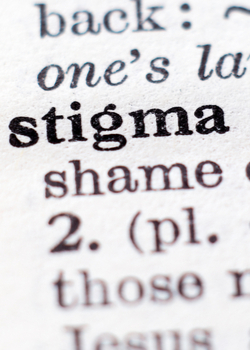How Words Can Help Us Overcome the Stigma of Addiction

- If I tell anyone, I’ll lose my job and my family will probably disown me.
- I need help, but if I get treatment, they might take my kids away.
- My neighbors wouldn’t respect me if they knew I was struggling — they’d probably want me to move.
- I mentioned my drug use to my doctor once, and she called me an addict. I felt so ashamed I never brought it up again.
What’s the common theme in each of these situations?
The possibility of overcoming addiction stigma seems completely out of reach in each scenario.
Why Overcoming Addiction Stigma is Crucial
 Stigma is a strong feeling of disapproval that most people in society have about something. It shames or discredits a person. In the thoughts above, there is a perceived or real stigma directed toward those struggling with addiction.
Stigma is a strong feeling of disapproval that most people in society have about something. It shames or discredits a person. In the thoughts above, there is a perceived or real stigma directed toward those struggling with addiction.
And what’s the result? People aren’t getting the help they need.
How do we know? Well, in 2019, 20.4 million people in the U.S. reported having a substance use disorder (SUD) in the past year. Yet only 4.2 million people received SUD treatment in that same time period.
We can’t say for sure what stopped the other 16 million from getting help … but stigma certainly plays a part.
Looking at the Language of Stigma
When people feel stigma and shame associated with a substance use disorder, it has a triple effect:
- It reduces the chances that the person will seek treatment.
- It influences the kinds of treatment the person is willing to accept.
- It affects the person’s ability to maintain a lifestyle that’s conducive to recovery.
One major factor in addiction stigma is language. Why? Because words are powerful. They can lift up and give hope, or they can beat down and leave someone feeling hopeless.
So the language people use when talking about addiction is important. It matters how professionals talk to patients about addiction. And it matters how we speak to people who are struggling with a substance use disorder.
Overcoming the stigma of addiction starts with the words we use to describe addiction. Words can ultimately have a huge impact on treatment engagement and treatment outcomes.
Changing the Dialogue Around Addiction
Using person-first and strength-based language can encourage both individuals and their families to seek help.
Person-first language focuses on the individual rather than the diagnosis. For example, instead of referring to someone as an “addict”, you could say “a person with a substance use disorder.”
The strength-based approach focuses on a person’s innate strengths or assets — essentially promoting the positive. This approach emphasizes the use of positive assets to empower the person and help them in their recovery.
An example of strength-based language is choosing the word “challenge” over “problem.” A challenge sounds like something you can overcome, but a problem sounds like something that will never go away.
Here are a few examples related to addiction:
- Instead of saying “addict” or “drug abuser,” you might say “person with a substance use disorder” or “person struggling with addiction.”
- Instead of using the terms “clean” or “dirty” to describe a drug screen, you might say “tested positive or negative for substances.”
- Instead of labeling someone a “former junkie,” you might say “a person in recovery.”
- Instead of saying “relapse,” you might say someone “experienced a setback in recovery” or they “experienced a brief return to use.”
Overcoming the Stigma of Addiction with Language
Changing the language can start with organizations and practitioners. To help in overcoming the stigma of addiction, organizations can standardize changes in terminology through written policies and procedures, while practitioners can start using mindful language in daily patient interactions.
Proactive steps that organizations can take include:
- Understand that “return to use” can be part of the SUD recovery process, and sometimes happens during SUD treatment.
- Debunk myths that encourage stigma.
- Integrate recovery specialists into their service to families.
- Provide training and education on how to best support families.
- Analyze organizational experiences through the eyes of an individual to help identify stigma in language, policies, and interactions.
Proactive steps that practitioners and individuals can take include:
- Focus on achievements and progress using a strength-based perspective.
- Remain patient during the recovery process.
- Respond to unique needs and circumstances to encourage successful engagement with addiction treatment.
- Recognize there are different responses to stigma (lashing out, withdrawing, perfectionism).
- Take a family-centered approach that promotes strong parenting skills and healthy parent-child relationships.
- Shift from identity-first language to person-first language in all interactions.